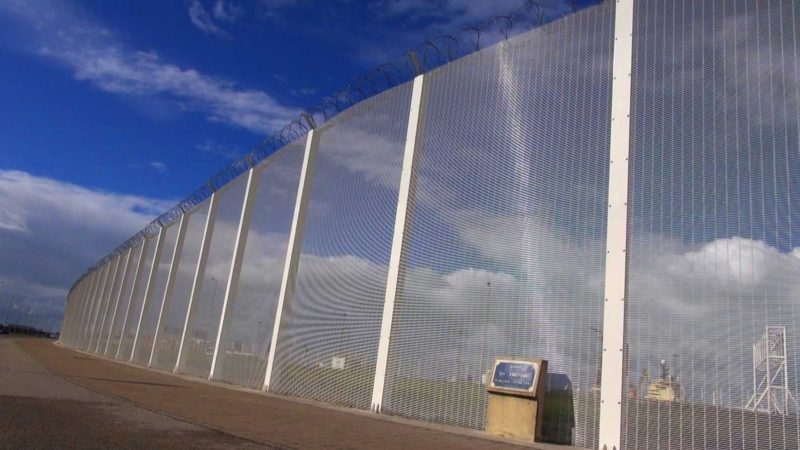In an attempt to stem the flow of migrants seeking refuge in Britain, the UK is beginning work on “a big, new wall” in Calais. With fences, barbed wire and surveillance cameras already in place, ‘The Great Wall of Calais’ is the newest effort to increase security at the French port of Calais.
A joint £17m effort by the UK and France, the wall will be constructed in two parts, one kilometre long and four metres high, on either side of the road approaching the French port. Construction is intended to begin this month, with expected completion at the end of the year. It is the most recent effort to increase security and prevent the approximately 7,000 – 9,000 migrants living in the Calais refugee camp, nicknamed the “Jungle”, from illegally boarding trains, ferries, transport trucks and other vehicles passing through the Channel Tunnel en route to the UK.
The UK is a popular destination for migrants seeking asylum for a number of reasons. Many have relatives living in the UK or are interested in migrating to an English speaking country. Some believe they will have more employment opportunities and access to the open labour market, and others believe there are better housing and education options.
However, it is unlikely that this wall will have the effect Anglo-French leaders hope for in deterring and preventing migrants from reaching the UK.
The problem with walls is that they never really work. There are a number of examples throughout history that demonstrate the failure of walls to achieve their intended purpose or prove as a lasting solution – as evidenced by such failures as the fall of the Berlin Wall in 1989.
Nevertheless since 1989, over 40 countries have erected walls or fences against their neighbours, seeking to keep out unwanted migrant populations or guarding against potential threats to national security. The most notable examples of border walls/fences are between the US-Mexico border, Israel’s West Bank barrier or the Korean Demilitarized Zone.
Walls are a temporary solution for a much larger issue and fail to address the underlying source of tensions between feuding parties. Not only do walls fail to address or resolve these tensions, they may also aggravate the issue at hand. So while the wall in Calais may offer some temporary relief in slowing the numbers of migrants hitching rides on transport trucks, the “Jungle” will continue to grow and house ready migrants waiting for the chance to reach Britain.
Even guarded walls offer little deterrence to people who believe life is better on the other side. Walls will make people attempt more dangerous means to get around, over, under or through the barriers. While it is often difficult to measure the number of closed border crossings, it is clear that these crossings do occur as evidenced by the number of people who risked their lives to get over the Berlin Wall or who continue to illegally cross the US-Mexico border with the help of human traffickers. Calais will be no different; migrants will continue to find ways to get into Britain. Although it will be more challenging, migrants will be no less deterred by a wall than they are by the existing fences or armed police guarding the ports.
Historically, walls have been a popular strategy in claiming territory, setting boundaries, ensuring protection or maintaining jurisdiction. They have isolated communities and separated feuding parties to keep “others” out, whilst enshrining an “us vs. them” attitude. The narrative of the loathsome “other” as dangerous, untrustworthy and different is an idea that invades the mindset of those within the protection of the wall and bolsters support for the wall. Walls make it difficult to understand or have compassion for those who are on the other side of the wall, not only because normal social interactions are impossible due to the physical barrier, but because the fear and distrust of the “other” becomes rooted in the national narrative. Therefore, while the wall in Calais may only provide a temporary physical barrier, it may have a much larger impact for those living in Britain with a growing fear of migrants.
At the same time, it should be noted that walls can be successful and their impact should not be underestimated. Walls do act as a deterrent for some and continue to be used as a means of protection or exclusion. One such notable example is the Korean Demilitarized Zone, which not only prevents people from crossing the border, but has also effectively divided Koreans who were once one nation of people. So while walls have their shortcomings, their success even if only temporary, can effect the intended change.
With walls being a hot topic in Western news media recently, it is important for nations to be conscious of the failures of barriers and the problems associated with establishing these divisions. The wall in Calais is unlikely to yield the results British decision makers desire or to resolve illegal migration, but it may slow down the number of migrants entering the UK.
Photo: “The fence surrounding the port of Calais next to “The Jungle” in Calais, France.” (2016), by VOA/Nicolas Pinault via Wikimedia. Public Domain service of the US Federal Government.
Disclaimer: Any views or opinions expressed in articles are solely those of the authors and do not necessarily represent the views of the NATO Association of Canada.




